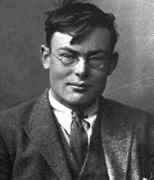Person: Ramsey, Frank Plumpton

Frank Ramsey was an English mathematician most important for his work on the foundations of mathematics and philosophy, but best known for his so-called Ramsey theory in combinatorics.
Mathematical Profile (Excerpt):
- Arthur Ramsey was President of Magdalene College, Cambridge, and a tutor in mathematics there.
- Ramsey entered Winchester College in 1915 and from there he won a scholarship to Trinity College, Cambridge.
- At Cambridge, Ramsey became a senior scholar in 1921 and graduated as a Wrangler in the Mathematical Tripos of 1923.
- After graduating, Ramsey went to Vienna for a short while, returning to Cambridge where he was elected a fellow of King's College Cambridge in 1924.
- It is worth noting that this was a most unusual occurrence, and in fact Ramsey was only the second person ever to be elected to a fellowship at King's College, not having previously studied at King's.
- It was a short career, for sadly Ramsey died at the beginning of 1930.
- Although Ramsey was a lecturer in mathematics, he produced work in a remarkable range of topics over a short period.
- As well as starting up the new area of mathematics now called 'Ramsey theory', which we say more about below, he wrote on the foundations of mathematics, economics and philosophy.
- Ramsey's aim in this paper, however, was to improve on the Principia Mathematica and he did so in two ways.
- However, the semantic paradoxes such as "this is a lie" are, Ramsey claims, quite different and depend on the meaning of the word "lie".
- Ramsey published Mathematical Logic in the Mathematical Gazette in 1926.
- This examines methods for determining the consistency of a logical formula and it includes some theorems on combinatorics which have led to the study of a whole new area of mathematics called Ramsey theory.
- Most certainly 'Ramsey theory' is now an established and growing branch of combinatorics.
- The combinatorics was introduced by Ramsey to solve a special case of the decision problem for the first-order predicate calculus.
- This work on probability, and also important work on economics, came about mainly because Ramsey was a close friend of Keynes.
- Being a friend of Keynes certainly did not stop Ramsey attacking Keynes' work, however, and in Truth and probability , which Ramsey published in 1926, he argues against Keynes' ideas of an a priori inductive logic.
- Ramsey's arguments convinced Keynes who then abandoned his own ideas.
- In economics, Ramsey wrote two papers A contribution to the theory of taxation and A mathematical theory of saving.
- It was philosophy, however, that was Ramsey's real love.
- For profitable thought in this most difficult field Ramsey was superbly equipped, and there is no doubt that his early death has deprived the world of one of its most promising philosophers.
- One would have to say, however, that Ramsey's work in philosophy has been somewhat overshadowed by that of Wittgenstein.
- Recently, however, Ramsey's work in philosophy seems to be receiving more attention.
- Several of the articles cited in the references paint vivid pictures of Ramsey's character.
- Frank, as a militant atheist, regretted.
- Ramsey suffered an attack of jaundice and was taken to Guy's Hospital in London for an operation.
Born 22 February 1903, Cambridge, England. Died 19 January 1930, London, England.
View full biography at MacTutor
Tags relevant for this person:
Origin England
Thank you to the contributors under CC BY-SA 4.0! 

- Github:
-

- non-Github:
- @J-J-O'Connor
- @E-F-Robertson
References
Adapted from other CC BY-SA 4.0 Sources:
- O’Connor, John J; Robertson, Edmund F: MacTutor History of Mathematics Archive
